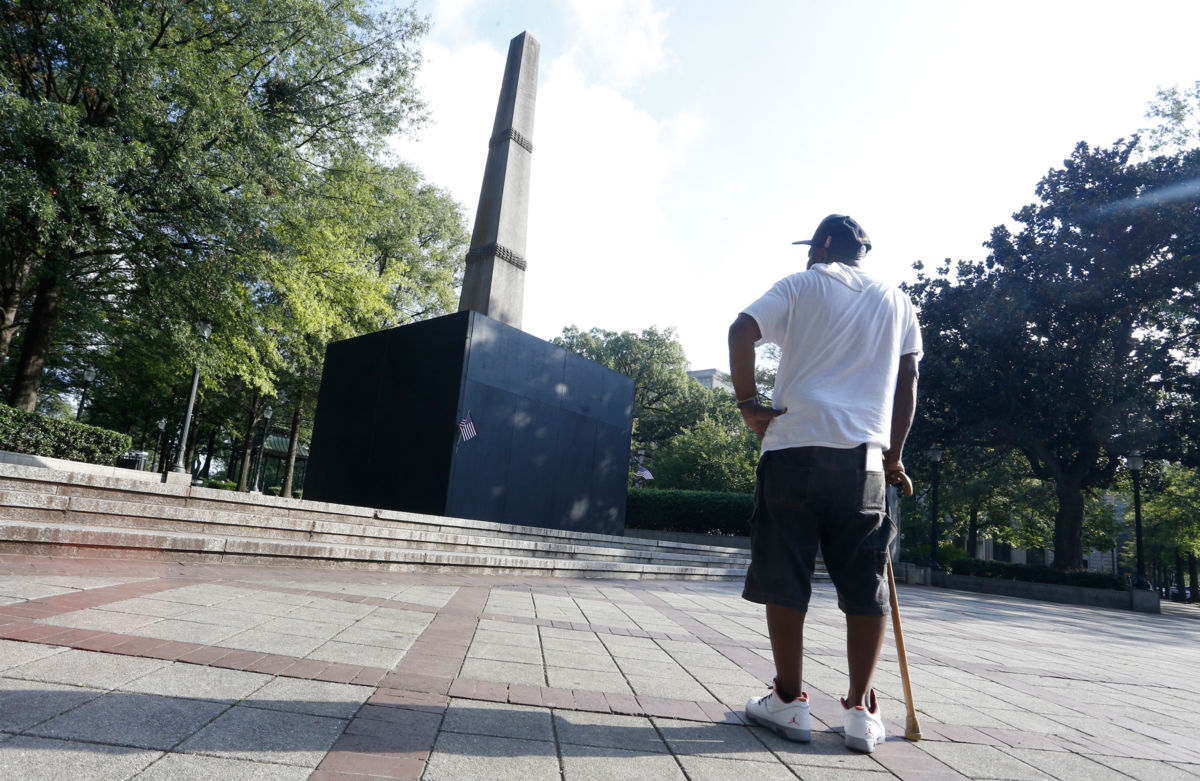In 2017 the mayor of Birmingham decided to cover up a Confederate monument — but the result was a suit from Alabama’s attorney general, who charged the city with violating a law that makes it illegal to interfere with Confederate monuments without statutory approval.
An Alabama judge just issued a ruling in the case and sided with the city: This is a free speech issue, the judge asserted — and the state can’t force Birmingham to display a statue that the city no longer feels comfortable with.
This is huge news for civil rights advocates in Alabama who are fighting to take Confederate monuments off public display. It could also be a warning sign for other states with similar laws, like North Carolina.
Until now, officials have hidden behind such laws to justify the refusal to remove or cover such statues — sometimes forcing members of the public to take matters into their own hands. This ruling suggests that it could be possible to make a case that these kinds of laws are not constitutional.
Controversies over Confederate monuments tend to revolve around “preserving history” in the face of people who say these statues are actively harmful. For black residents and visitors, encountering Confederate monuments feels extremely unwelcoming.
A growing number of cities and institutions have chosen to explore their heritage and history in other ways, and it’s especially notable that many of these monuments do not date back to the Civil War. Instead, they reflect a period in the late 1800s and early 1900s when a great deal of revisionist history was being written, and states were deeply entrenched in Jim Crow — a racist response to the Civil War, Reconstruction and the liberation of slaves.
Removing statues from display doesn’t silence history — but it does allow them to be presented in better context, allowing people to understand the history of Confederate monuments and the role they played in communities. Leaving them installed on public land lends them, and the things they symbolize, an official air — one that lends weight to white supremacists across the country.
Taking statues down won’t magically fix racism or end an intergenerational system of oppression, but it’s a step in the right direction for cities willing to back that decision with a genuine conversation about how to address racial equity.
The battle isn’t over, and the monument remains in place — albeit covered up, for now. The Alabama attorney general’s office has already indicated that it plans to appeal the ruling, which is the state’s legal right.
The arguments made by the judge in the decision, however, are pretty compelling: You shouldn’t be able to tell a city what to display or not display. Likely those who fixate on the Lost Cause would be pretty upset if the state passed a law mandating the display of other kinds of memorials that conflict with their agenda, and turnabout is fair play.
If you can’t force a city to have a lynching memorial, you can’t force it to celebrate white supremacy in the town square.
For now, here’s hoping that the successful Alabama challenge will lend weight to campaigns to remove statues in states with similar laws, like North Carolina, Virginia and Tennessee. The Lost Cause is lost, and it’s time for everyone to catch up.
4 Days Left: All gifts to Truthout now matched!
From now until the end of the year, all donations to Truthout will be matched dollar for dollar up to $44,000! Thanks to a generous supporter, your one-time gift today will be matched immediately. As well, your monthly donation will be matched for the whole first year, doubling your impact.
We have just 4 days left to raise $44,000 and receive the full match.
This matching gift comes at a critical time. As Trump attempts to silence dissenting voices and oppositional nonprofits, reader support is our best defense against the right-wing agenda.
Help Truthout confront Trump’s fascism in 2026, and have your donation matched now!
